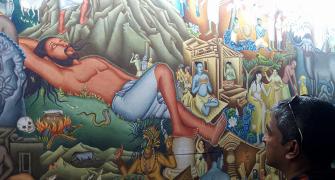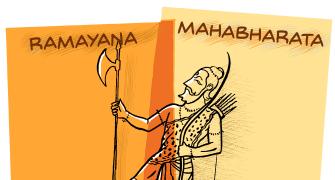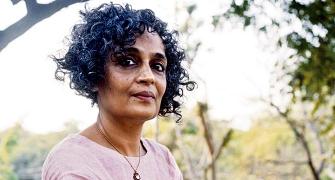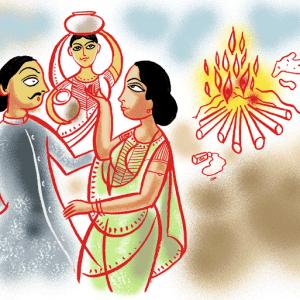Saratchandra grappled with caste, gender and economic inequalities, and questions of nationalism that needed to be separated from the politics of religious nationalism all through his writing life. All of which, writer Anindita Mukhopadhyay points out, are highly contemporaneous.

Illustration: Dominic Xavier/Rediff.com
Saratchandra Chattopadhyay (1876-1938) had hooked his personal philosophy of writing to the invisible 'wretched of the earth' in a speech (1936):
'Those who have given their all to this world, and got nothing in return, the deprived, the weak, the oppressed… Their pain has unlocked my lips…'
The statement pointed to the range of issues -- caste and gender inequalities, economic inequalities almost always based on deeply fissured social realities, questions of nationalism, which needed to be separated from the politics of religious nationalism -- Saratchandra had grappled with all through his writing life.
All his concerns seem highly contemporaneous.
Despite his discomfort with the unaccommodating nature of the problems that exercised his conscience (socio-economic inequalities or religious nationalism obviously were not short-term issues with easy solutions), the easy playfulness and humour in his style leaven these weighty matters and first compel the reader's amused attention, and then rope in his/her conscience.
Even his world of children flash with the clash of metaphorical swords fashioned in humour. Thus, young imaginations, unfettered by worldly adult devotion to godmen, perceive them to be ordinary human beings receiving an extraordinary degree of worshipful attention.
The bathos of the ordinary yoked to the divine is shown up ludicrously when a godman is tricked into experiencing intense and very ordinary human terror in the face of imminent danger to his life. The unbelievable cruelty and indifference of highly religious adults to animals and even human beings in the name of religious symbols, rites, and rituals, or caste purity, are horrific realities that young imaginations are sensitive to (or should be sensitive to).
Laalu, figuring in three [namesake] stories [in Stories from Saratchandra: Innocence and Reality], is a rebel, though a general village favorite, and represents the free-thinking young individual unshackled with customs. He cherishes no reverence for the family godman and is critical of blood-sacrifice sanctioned by religion. Though he reluctantly slaughters two terror stricken and helpless sacrificial goats, he ensures that the bloody rite is scrapped thereafter.
Very subtly Saratchandra slips in the point that adult minds, steeped in set patterns of thinking, are frozen.
The pain of a starving bull, albeit an animal that was and continues to be sacred to Hinduism and the Hindus, remains totally invisible to the very people who profess to be its religious champions.
Mohesh, after the eponymous bull, reveals a micro-study of a blinded Hindu village community, indifferent to the material conditions of animal and human misery, yet ironically obsessed with a formulaic religiosity that contains only materialistic concerns. Mohesh's death, actually a providential release from a miserable life of want, becomes a matter of anxious religious debate.
Abhaagi's Heaven explores a similar mechanistic upper-caste performance of the rituals around death, which leaves them emotionally untouched. Again, ironically, it is a low–caste young woman, Abhaagi, whose epiphanic realization of the spiritual grandeur of death makes her court death to achieve this grand spiritual exit from her humdrum everyday. Her desire turns on the ritual of cremation at the hands of her son, which turns out to be an impossible upper-caste preserve which the corpse of Abhaagi does not deserve.
Saratchandra's outrage at the village community's oppressive and insensitive caste rules shockingly connects us to our present, for the Bengal village of a hundred years ago is still discernible across modern India today -- perhaps exhibiting more brutality in the face of social change.

The powerful appeal in Saratchandra's writings lies in his use of the first person to explain ethical dilemmas.
Through the three Laalu stories, A Tale of Some Fifty years Ago, Bilasi, Memories of Childhood, and in Memories of Deoghar, one hears a voice which owns up to the 'I', and foregoes a position of heroism and nobility and claims an average person's position.
All these stories indirectly bracket the 'I' , the 'myself', the 'me', as the conforming individual who does not have the strength to rebel against oppressive social diktats, but who can appreciate the unconventional, yet highly courageous conscience-keeper of a society whose conscience is smothered in unthinking, cruel and unreflexive mind-sets.
The autobiographical vein, also evident in Memories of Childhood (Balyosmriti), lights up the dark recesses of an uncomfortable conscience -- which does not want to acknowledge mental cowardice and yet which is stamped with a self-criticism that takes a hard look at the manner in which the 'I' constantly fails living beings dependent on 'my' strength.
Saratchandra clearly felt that childhood and youth should not be too fixated on the eventuality of adulthood. Young minds should not simply aspire to the right kind training to achieve the maximum material advancement as a 'successful' adult -- for this was too calculating.
This importance of an impulsive and heedless childhood, a living in the present, a lack of fear as to the future, total emotional commitment to friendships, the ability to love without any preconditions, is also the ethical core of the future adult. Without these secret memories of joy, of shame, of humiliation or sorrow, the adult cannot successfully navigate the complex world of adult emotions. Saratchandra's Memories of Childhood explores how a middle-class self-willed youngster discovers in himself a social and humane conscience when he made a cook his friend.
A fairly constant theme in Saratchandra's writings is that the human being is emotionally whole in childhood and youth, with the ability to feel and act without self-interest. This conviction undergirded Saratchandra's call to the 'passion' and 'selflessness' of the youth to serve the nation.
Nationalism was a generous, open emotion, untainted by religious identities, which only the imaginations of the young could relate to.
Saratchandra lived and wrote when India and Indians were under foreign rule. Bypassing the politics of the adults, Saratchandra instead romantically invoked the ideals, idealism, and a passionate will to act -- which he could only sense in the youth.
To connect with Saratchandra's hope and optimism for the future, which lay in his vision of free-thinking young people, learning or perhaps groping their way to their personal ethical codes, is surely relevant to today's youth.
Anindita Mukhopadhyay teaches history in the University of Hyderabad. She has translated Rabindranath Tagore's Sesher Kobita -- The Last Poem and authored Behind the Mask: The Cultural Definition of the Legal Subject.
Her newest work, a translation of Stories from Saratchandra: Innocence and Reality, was published recently.









